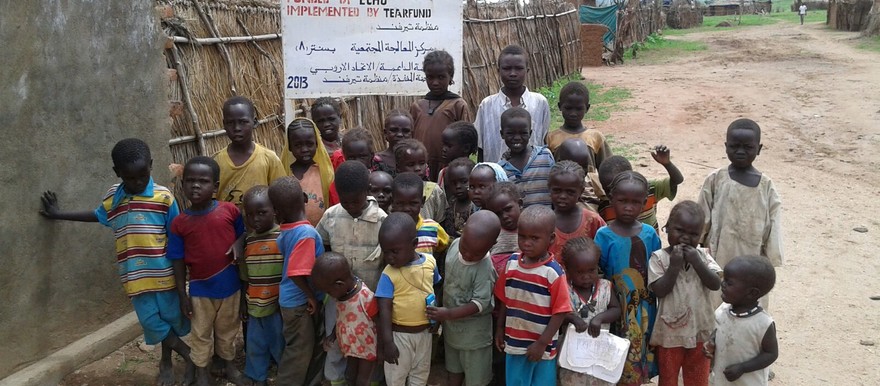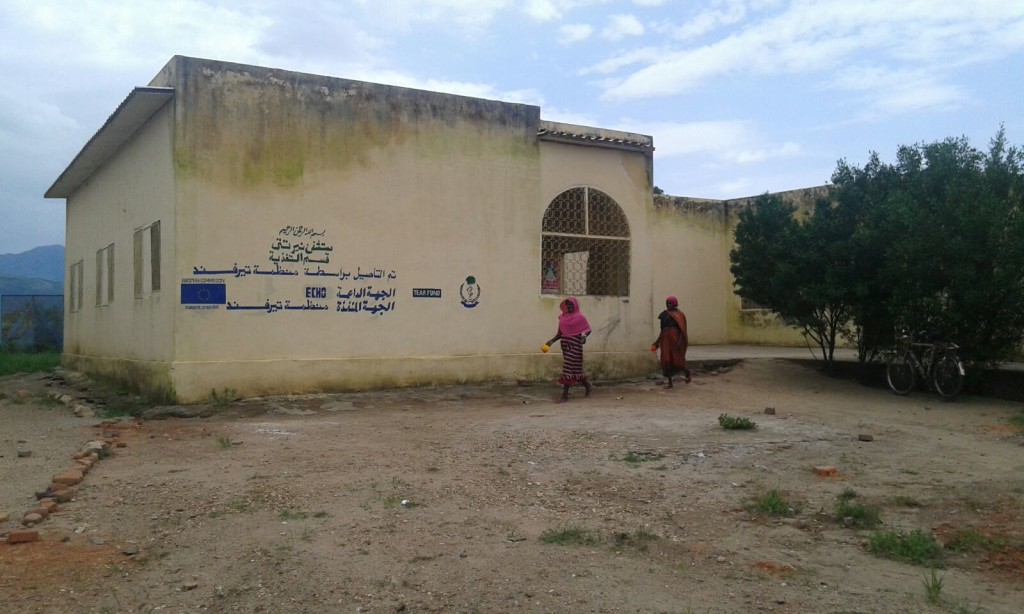“Khartoum Steps up its War on Humanitarian Relief Efforts in Darfur” |
Eric Reeves | 15 December 2015 | http://wp.me/p45rOG-1PQ
Radio Dabanga reports today that one of the major International Nongovernmental (Humanitarian) Organizations (INGOs) still operating in Darfur was assaulted yesterday (December 14, 2015) by security forces in Nierteti (formerly West Darfur, now part of a factitious “Central Darfur”). The character of the assault on UK-based Tearfund augurs poorly for the organization’s ability to remain in any of its locations in Darfur. Currently Tearfund operates not only in Nierteti—where it serves the people of Tour, Guldo, Golo, Gurnei, and Ardeba, as well as in the camps for the displaced in Nierteti, Um Dukhun, Garsila, and the capital Zalingei—but operates in Kass and Ed Daein in South Darfur. The organization has support bases in Nyala (South Darfur), Zalingei (“Central”/West Darfur), and Khartoum.
Children in front of Tearfund office
According to the highly-informed Radio Dabanga:
Security agents reportedly closed the office of the UK-based Tearfund organisation, working in the field of health and nutrition, in Nierteti, Central Darfur, on Monday (December 15, 2015). A source reported to Radio Dabanga from Nierteti that a force of security agents, led by a colonel, stormed the organisation’s office at 1 pm. “They seized all the materials, equipment, and devices, including the cash in the treasurer’s safe, amounting to more than SDG250,000 ($39,220), and personal belongings of the staff members. “They then took the foreign and Sudanese staff to the office of the National Intelligence and Security Service (NISS) in Nierteti,” he said. (all emphases in all quotes have been added)
There can be little doubt that this move was a deliberate effort to pressure Tearfund to withdraw from all locations in Darfur. This assault was meant to be not only destructive of resources but threatening to the safety of staff, both national and international. In the past Khartoum has often simply expelled organizations—more than two dozen to date, including many of the world’s finest—and if Tearfund should decide to remain, despite this outrageous provocation, it appears highly likely that they too will be expelled.
It is no accident that the office targeted was in the very midst of a region that is experiencing extraordinary levels of violence against civilians. Tearfund’s presence provides eyes on the ground, witnesses to massive, ongoing atrocity crimes. It is inconceivable that in the climate of fear and terror that Khartoum has created the Tearfund office would have done anything to provoke or justify yesterday’s assault. That the assault was led by a colonel of the National Intelligence and Security Services (NISS), and that NISS carried out the operation, suggest a high-level decision, part of Khartoum’s broader and largely effective effort to remove all international humanitarian relief organizations from Darfur. Tearfund is certainly one of the very largest and most important of those organizations that have remained in Darfur.
But it is also in a position to see the consequences of the terrible destruction and dire humanitarian conditions in East Jebel Marra and the Jebel Marra massif itself. Two weeks ago, Radio Dabanga reported on findings reported by Tearfund and others:
Tearfund has reported that a total of 423 severe acute malnutrition cases from the inner Jebel Marra were admitted to their treatment centres in February 2015. In June 2015, three national NGOs carried out an assessment to government-controlled areas of East Jebel Marra (Deribat, Dira, Kiba, Koroni, Soro, Korbal, Baimadina, Sawani, Bele-Serif, Leiba, and Jawa) and established that approximately 20,000 affected people are in urgent need of water and sanitation services, health, nutrition, education and emergency shelter. No assistance has been provided up to date.
This is not the kind of reporting that the Khartoum regime wishes to see made public. Moreover, the regime is well aware that compelling Tearfund to withdraw will affect far more than the 20,000 people without any food, water, or sanitation: it will affect all the locations in a region that has been the subject of a brutal genocidal campaign for more than two years.
Unsurprisingly, Radio Dabanga is the only news organization reporting on this highly consequential violation of International Humanitarian Law (IHL). Those who on other occasions profess deep concern for IHL violations have been consistently silent on Darfur. But if unchecked, the assault on Tearfund—really an assault on international humanitarian relief efforts generally—may prove the tipping point for other organizations as well. Silence encourages Khartoum to believe that it may proceed with this longstanding project of removing all international humanitarian presence from Darfur—“Sudanizing” relief efforts, which means little more than lip service, provided by a very few national organizations which have minimal funding and very little of the capacity provided by INGOs (even when staffed, as nearly all are, by Sudanese nationals).
Which will it be? Silence or strenuous protest, with serious consequences threatened? If the past is any guide, the former will take Darfur one step closer to utter catastrophe.
If Tearfund ends its operations in Darfur because of Khartoum’s assault on its offices in Nierteti, it is likely that other INGOs will follow suit
(Both Radio Dabanga dispatches are included below:
Central Darfur security raids INGO office in Nierteti | December 15, 2015 | Nierteti, (“Central”)/West Darfur
Security agents reportedly closed the office of the UK-based Tearfund organisation, working in the field of health and nutrition, in Nierteti, Central Darfur, on Monday. A source reported to Radio Dabanga from Nierteti that a force of security agents, led by a colonel, stormed the organisation’s office at 1 pm. “They seized all the materials, equipment, and devices, including the cash in the treasurer’s safe, amounting to more than SDG250,000 ($39,220), and personal belongings of the staff members. “They then took the foreign and Sudanese staff to the office of the National Intelligence and Security Service (NISS) in Nierteti,” he said.
A staff member of Tearfund in Sudan told Radio Dabanga on personal title that the organisation provides health and nutrition services to nearly five million [sic] people in the Darfur region [Tearfund’s service is extensive, but this is clearly an error in translation or composition—ER]. “Tearfund in Central Darfur is providing aid to people in Tour, Guldo, Golo, Gurnei, and Ardeba, as well as in the camps for the displaced in Nierteti, Um Dukhun, Garsila, and the capital Zalingei,” he said. Tearfund operates in three out of the five states that make up Darfur: Um Dukhun and Nierteti in Central Darfur, Ed Daein in East Darfur, and Kass in South Darfur. Tearfund has support bases in Nyala (South Darfur), Zalingei (Central Darfur), and Sudan’s capital, Khartoum, according to the organisation’s website.
Its work in Darfur is funded by donors including the governments of UK (DFID), Canada (CIDA-HAPS through partner World Relief Canada), Australia (AusAid through Partner TEAR Australia), the European Commission’s Humanitarian Aid Office (ECHO) and the Development and Cooperation-Europe Aid Office, United States (OFDA), the United Nations, the Canadian Foodgrains Bank, and Tearfund supporters.
Sudan: East Jebel Marra Fact Sheet – People Blocked From Humanitarian Aid | Radio Dabanga, Nov 27, 2015 | East Jebel Marra, North Darfur
The United Nations’ Office for the Coordination of Humanitarian Affairs (OCHA) has released an update on the humanitarian situation in Darfur’s East Jebel Marra. The office reported that up to this day, nearly 21 percent of the population in the massif has been displaced to camps for displaced people in recent months. According to a Sudanese aid commission and community leaders, this figure has tripled in the past months.
The East Jebel Marra massif lies in the centre of the Darfur region, bordering the state divisions of Central, South and North Darfur. It is a fertile region inhabited mainly by the Fur tribe and has since 2003 been the primary stronghold of the Sudan Liberation Armies (SLA). It is the only place in Darfur where armed opposition maintains prolonged control over territory and the only area in Darfur to which humanitarian organisations have had no access as of 2011.
For its report, OCHA focused on the mountainous areas in the centre of the massif, the “inner Jebel Marra area,” parts of which are controlled by the Sudanese government and parts by the SLA rebels.
Population figures
There are no reliable population statistics for the inner Jebel Marra. The latest census was completed in 2008, and then only for certain parts of the inner Jebel Marra. The lack of access for humanitarian organizations to the area since 2011 has hampered any collection of recent data. Current estimates indicate there are some 365,000 people living in the greater East Jebel Marra, and approximately one third of those – 120,000 people – live in the inner Jebel Marra.
Knowing that some 25,000 people (of the 120,000 people in inner Jebel Marra) have been displaced to camps for internally displaced persons in Central and North Darfur in recent months, OCHA estimates that today there could be some 95,000 people in the inner Jebel Marra, stating that nearly 21 percent of the total population is displaced. Of these 95,000, however, the Humanitarian Aid Commission (HAC) and community leaders have reported that some 47,600 people have been displaced in recent months; meaning that 60 percent of the Jebel Marra population has been displaced.
Tearfund has reported that a total of 423 severe acute malnutrition cases from the inner Jebel Marra were admitted to their treatment centres in February 2015. In June 2015, three national NGOs carried out an assessment to government-controlled areas of East Jebel Marra (Deribat, Dira, Kiba, Koroni, Soro, Korbal, Baimadina, Sawani, Bele-Serif, Leiba, and Jawa) and established that approximately 20,000 affected people are in urgent need of water and sanitation services, health, nutrition, education and emergency shelter. No assistance has been provided up to date.
Aid delivery blocked
Access restrictions to East Jebel Marra not only prevent humanitarian organisations and individual actors from having an exact understanding of the population numbers in the area, but also block aid to people in need, OCHA writes. Main obstacles to free and regular access to the area include access restrictions by the parties to the conflict, preventing humanitarians from entering both government and rebel-controlled areas. Additionally, the unpredictable security situation in general: hostilities, including both ground fighting and aerial bombardment, are ongoing, according to reliable sources on the ground. The government has also expressed concern that humanitarian aid could directly support opposition fighters.

